I Am Backing Greece
By Philip Mudartha
Bellevision Media Network
05 Jul 2015: Greece is a member state of European Economic Community (EEC) since 1981. In 1993, member states of ECC formally became European Union (EU). But, EU did not have a common currency. Greece, like other member states, had its own national currency drachma and central bank. In 1999, EU implemented European Common Currency Mechanism. Its European Central Bank (ECB) headquarters in Brussels issued a new currency called Euro. Greece completed withdrawal of drachma from circulation at a swap rate of 340.75 to 1 Euro by 1st January 2001.
Background of crisis
Since Greece joined Eurozone, it wound up its central bank, its mints were closed and it lost the freedom to print its own paper money. The Greek governments and banks had to borrow money from foreign governments, ECB or International Monetary Fund (IMF) when the national economy did not generate surplus or its government expenditure was greater than its revenue.
And the Greek governments spent beyond their means. Greece borrowed from EU institutions, ECB included. Greece lives in cities, with more than 70% of Greeks living in only two cities. The capital, Athens and its suburbs are home to about half of the population. So, Greece built world class urban infrastructure including the Olympic Stadia and Sports facilities with borrowed money. It hosted the Olympics in 2004.
The Euro loans were given at hefty interest rates with tough repayment schedules and terms. Successive right-of-center governments in Greece bowed to the lender nations led by hawkish German Chancellor Angela Merkel and continued to borrow more money. The stage was set for a crisis, which loomed with the global recession of 2008.
Greece is troubled with a serious economic recession for seven years
My first trip to Greece was in May 2006. The country and its friendly people bewitched me. I wanted to go again. I did go in June 2012. Since about three years, Greece was in the news, for all the wrong reasons. In the European debt crisis, Greece seemed to be the baddie. Greek want to have good life without paying their bills, said the citizens of lender nations, especially Germans.
I was forewarned not to include Greece in my European tour. “You are brave”, said a good friend, “Hope, you are not naïve”. He knew I have my own ways of doing things.
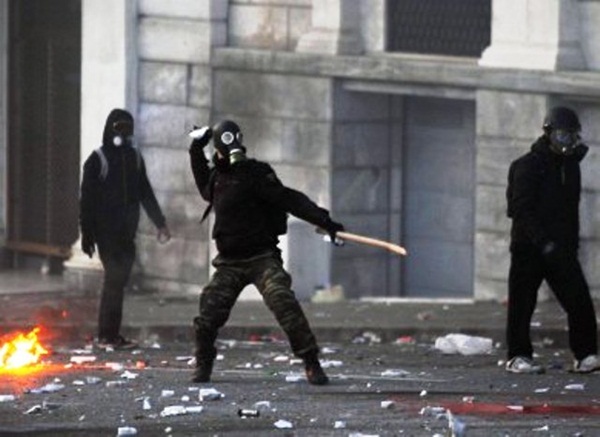
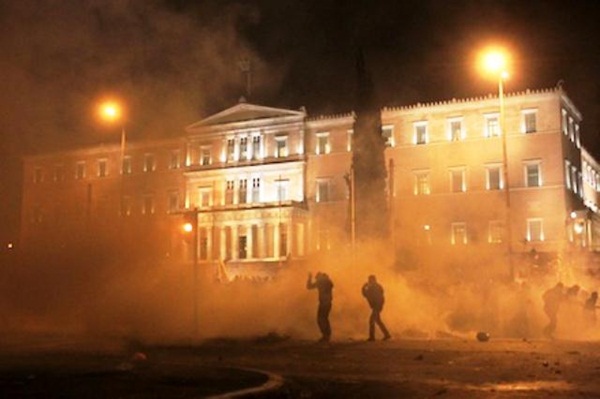
Western media had brought thousands of such images of violence, arson, and street riots and armed robberies in two main cities of Greece: the capital Athens and Thessaloniki in Northern Greece. None of this had escaped my attention, given that I am a self-styled student of Evolution of European Union and Eurozone ambitions.
I had waited till the second Greek elections since beginning of debt crisis tired people out and took them out of streets to take rest, sleep and recuperate to face the looming storm. That is why I flew into Athens from Rome on 25th June 2012 on a budget airline flight. Would I find my Athens to be as beautiful and enchanting as it was six years ago? Would I be lucky to savor the delights of a rich, relaxed and laid back way of life?
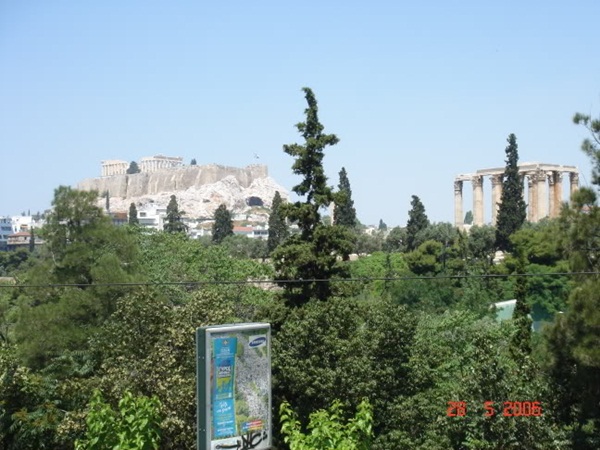
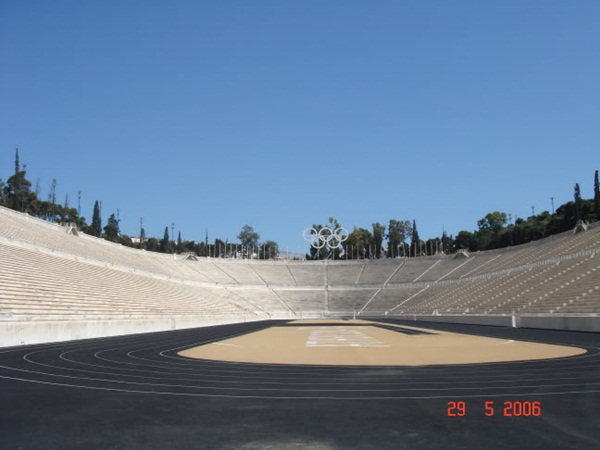
To my pleasant surprise, I found the Eleftherios Venizelos International Airport at Spata as chic, spit and clean, shining and warmly welcoming, to say the least. Is this really in Greece, a rich country living on borrowed money and is about to go bankrupt? My baggage arrived even as I reached the beltway, and within 15 minutes of landing, I was looking at the familiar sight of the grand motorway that emptied more than sixteen million tourists in a year, without clogging up terminal exits. Oppa!
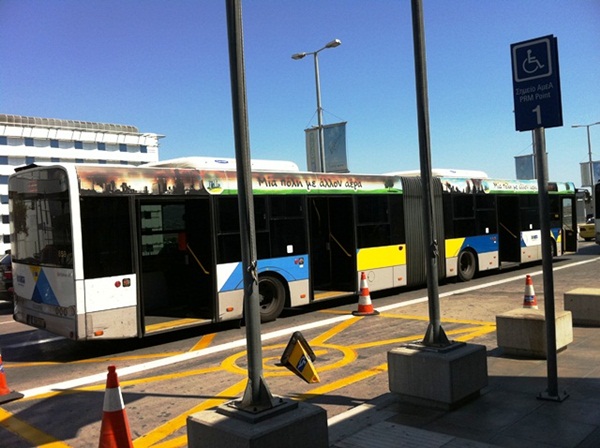
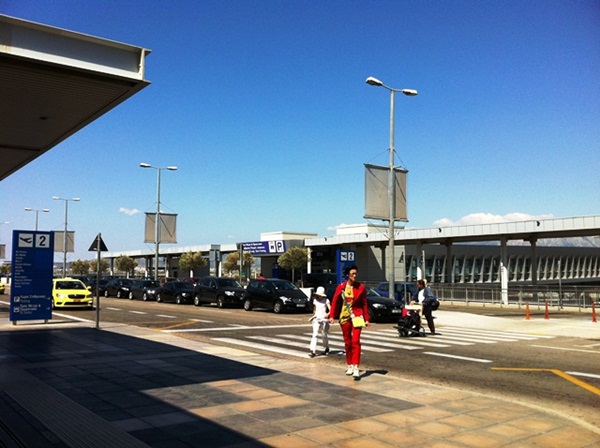
The X95 bus that runs between airport and Greek Parliament Square was waiting. For 5 Euro, I could ride it to reach city and then then board any other form of public transport within Athens Metropolitan for a total duration of 90 minutes once I validated my ticket on the bus. But to reach my hotel, which was 35 Kms away, I chose to ride Attiki Metro, opting to spend 7 Euro, for the experience and joy of travelling in one of the best maintained and punctual mass transit system on tracks.
I met young and beautiful Maria, a native of Sparta, and her husband on the platform. They were returning home after a weekend shopping holiday in Rome. Maria said she teaches Greek language in primary school and taught me Greek alphabets in 26 seconds. Her husband has lost his job as a sports instructor. Do not give up on him, I said. “I won’t” and to prove she leaned over and pecked on his cheeks. “We Greeks have no money” she informed me. “Yes, especially after shopping Italian Hand-made Fashion Shoes in Rome”, I quipped. She laughed, with such feminine charm; only Greek goddesses are capable of.
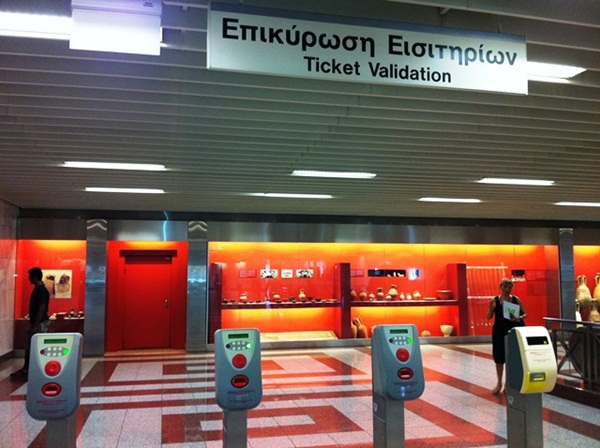
The Syntagma Metro Station residing under several floors below the Greek Parliament Building, it seemed to me, was as I had left it six years ago: clean, polished and chic. Each of its ticket validation machines looked as if installed new, though they were in service for twelve years! And, do not be under the impression that it is a privately owned and operated station. As I left the station using its German-made elevators and escalators, I passed by the janitors and sweepers and knew why. Please be reminded that these public servants took several wage cuts during the past two years, due to several austerity measures enacted by cabinets led by successive Prime Ministers. They hid their pain and anguish within; yet, did not shirk from their duty of keeping the Greek pride in private and public hygiene.
I lived at a 4-star hotel under which the Metaxourghio Metro Station has built. The hotel and the Karaiskaki Square are famous landmarks in Athens. Lugging my bag up the escalator and steps from the deep underground, I found myself on the door of the hotel. The hotel served delicious Greek cuisine and irresistible happy hour offers on finest local beers, not to mention complimentary Ouzo shots, on its rooftop garden restaurant, with a splendid view of Athens skyline, and the majestic Acropolis. Ouzo is a local aperitif, very sweet yet dangerously intoxicating. Later, I discovered Mastiha, an equally potent competition on the Greek Islands Sprouting out of Aegean Sea.
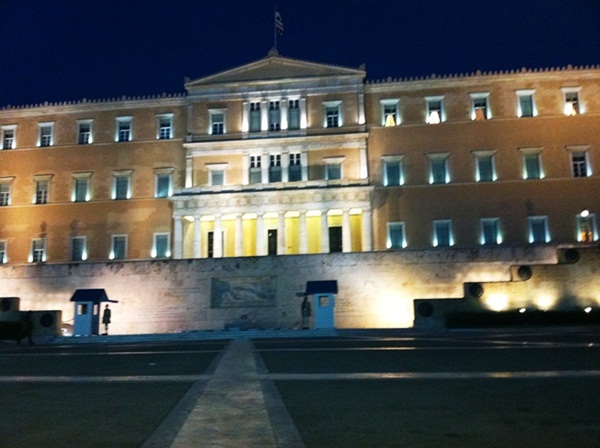
I went back to Syntagma Square to watch the Evzones guarding the Tomb of Unknown Soldier in front of Hellenic Parliament. At the stroke of hour, the guards exchange positions with a ceremonial marching routine, bemusing to hundreds of tourists who flock to film, for a photo-op with guards and the playful pigeons inhabiting the grounds in front of the front façade. I walked a mile through the national park, the ancient Roman Bath Ruins, The Temple of Zeus, the modern imitation of it in Zeppelin, the Panathinaiko Stadium (the site of 1896 Olympic Games) and returned to sit and gaze at Hadrian’s Arch at about midnight. When I returned back to Karaiskaki Square, it was deserted but for a few taxis flying the night trade. None of the signs of the recent riots were visible except for the graffiti on buildings and their compound walls. The two hour walking trip drained the Ouzo fire from my system, and slept blissfully during my first night in Greece.
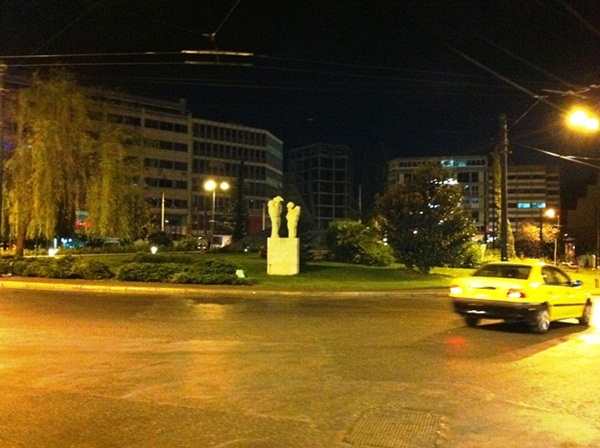
On following two days, I made exploratory visits to various ancient ruins that Athens is famous for, and to which every tourist flocks. For most, these are photo-ops to share with friends and to some these are serious academic trips. For me, these visits are aimed at learning and formulating my views on civilizations, their thought processes through ages including the present day, and the ethos that lives on.
I took a day long cruise to three major islands: Hydra, Poros and Aegina. I swam in the Aegean Sea. I played with horses waiting to carry tourists up the hills, stoked stray dogs watching time go by idly with their semi-closed eyes, and stray cats lazing and blinking at people. I watched as sparrows, crows and pigeons made a meal of leftovers, fighting for their share, but careful not to knock down wine glasses and not to create a mess around the dining table. The Greek horses, dogs, cats, crows, pigeons, and sparrows seemed civilized and giving space to each other, even as they respected the ethos of private and public hygiene as much as their human co-inhabitants of the lands.
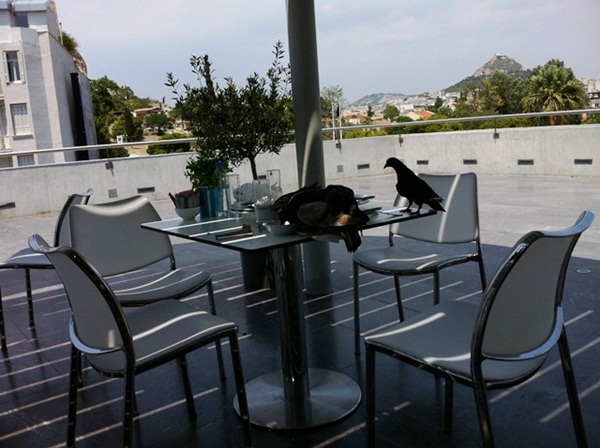
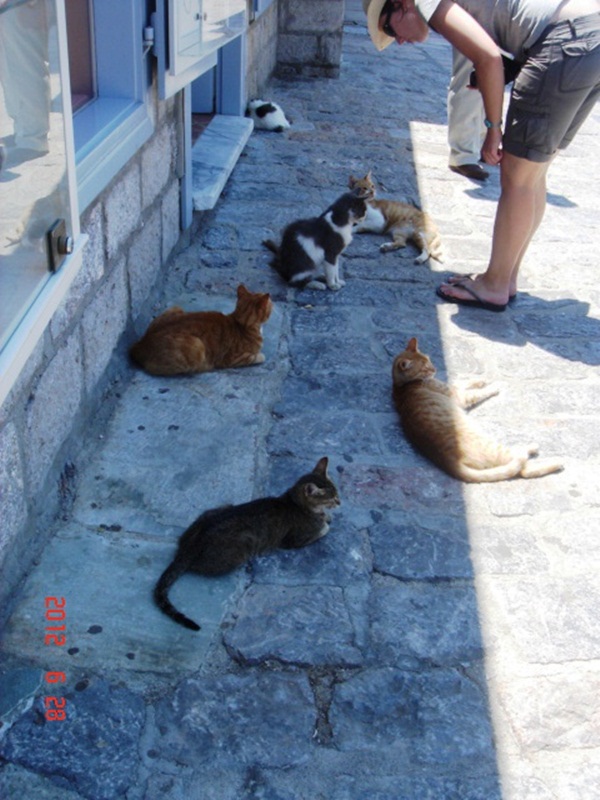
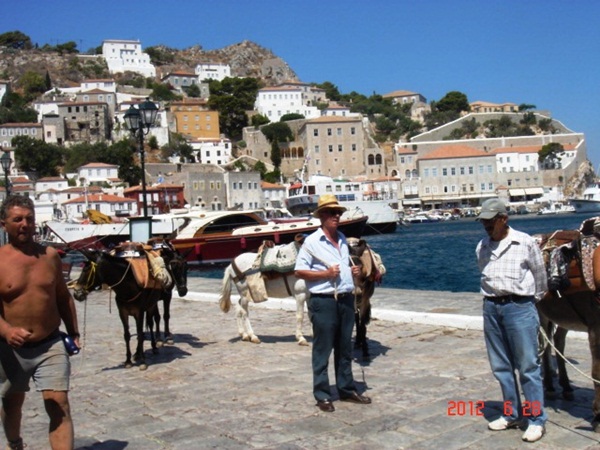
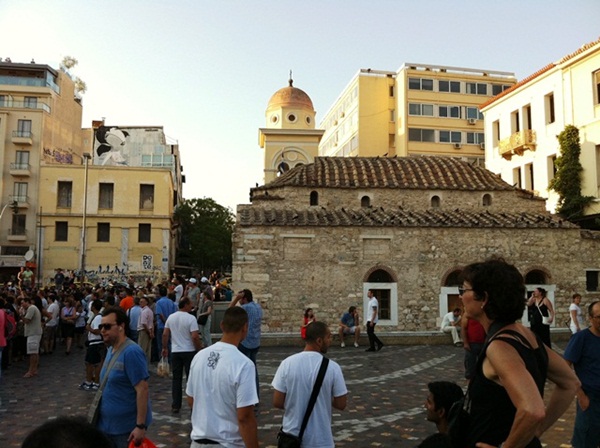
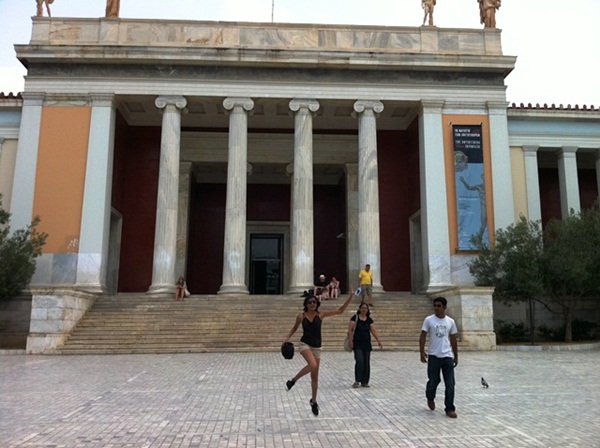
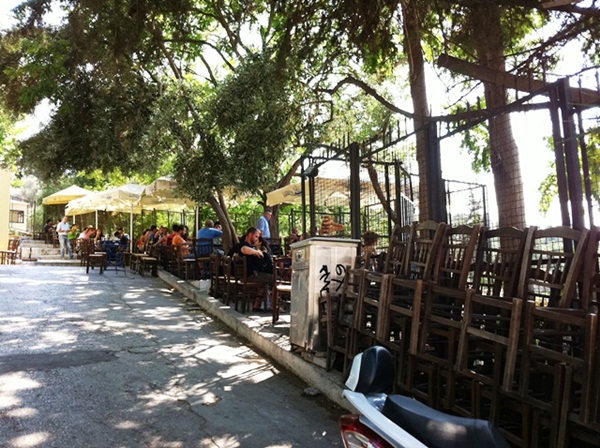
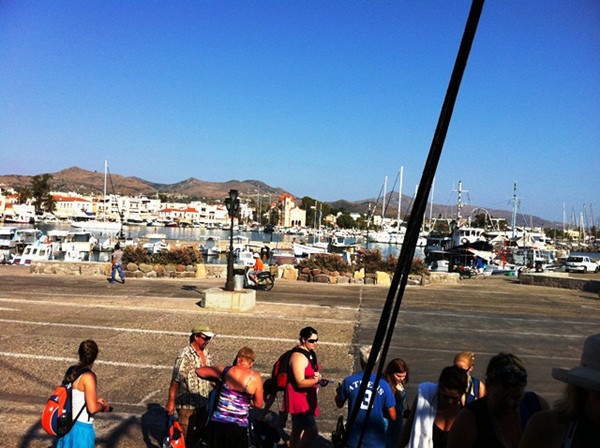
Where did the nearly 4 million citizens, nearly half a million illegal immigrants and a million tourists milling around ancient ruins around Acropolis and Plaka relieve themselves? The sun is unforgiving and the heat is unbearably punishing unless one takes a noon break under the shade of trees and the licensed restaurants on select pavements. People drink liters of water and tens of liters of chilled beer before, during and after the strenuous walking forays. I did not spot a single person irrigating anywhere in the open, throwing an empty bottle, can or cup except in designated trash bins, systematically placed and emptied regularly. There were not public toilets visibly available in squares, metro stations and public places, except within Acropolis. Only restaurants and shops provided free access to their own toilets after ordering food or buying something; otherwise, the coin operated public toilets could have been placed but were not marked like they were in Italian cities like Venice and Rome.
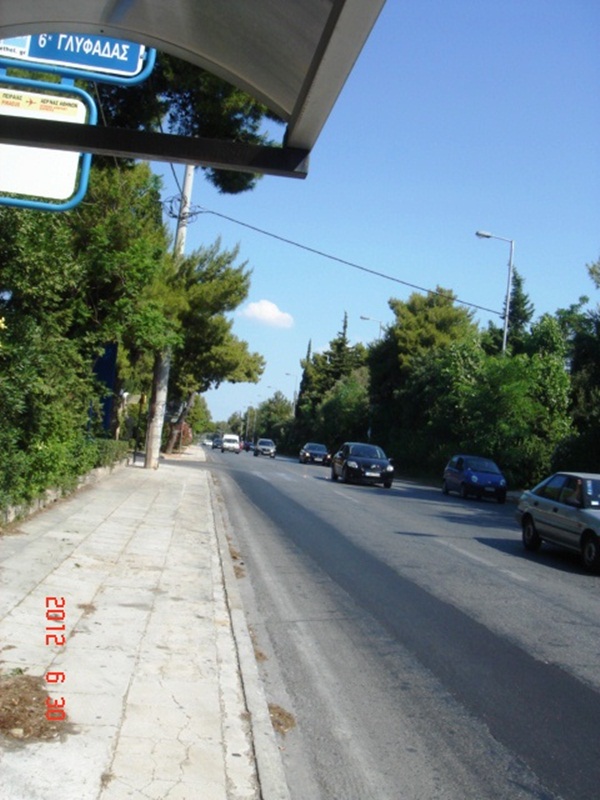
As I left the coastal town of Glyfada, where a three bedroom luxurious apartment can be purchased for a price of similar sized but basic apartment in an ugly suburb like Kurla in Mumbai, the only mess I noticed is the dry leaves from the trees lining the motorway, and strewn by the coastal winds onto the pavements. The city sweepers will come early in the morning and late in the evening for routine mop up.
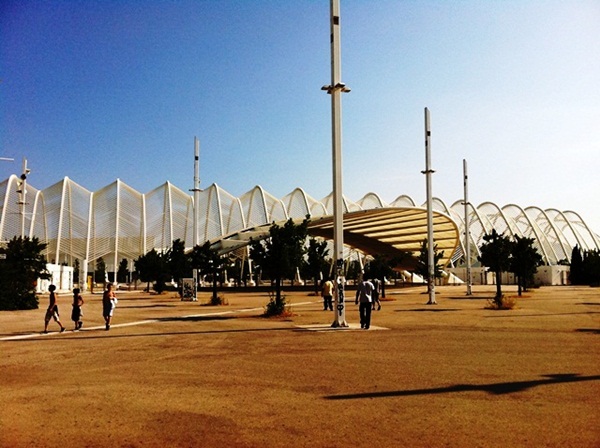
Of over two thousands of digital photographs from Europe, I will provide one I took of the Modern Olympic Stadia the Greek Government built to host the 2004 Athens Olympic Games. It is located between majestic hills at Irnia, a low income residential neighborhood, 20 miles from Athens. I felt sad to see that the massive investments have not been monetized but allowed to remain unutilized. Graffiti decorates every conceivable space. Fountains are idle. The pigeons are shitting all over the place, and janitors cannot keep pace with them. They are trying with hard toil, and the place is not exactly dead. The Greeks should emulate the Germans, who in Munich have turned the 1972 Olympic Games Village and Stadia into a money-spinning leisure spot. I know because I spent hours watching the revelers at that place. I returned from Greek Modern Olympiad with a heavy heart!
On positive note, I must say no human urine and excreta could be found, even under seemingly disused and an unkempt appearing place.
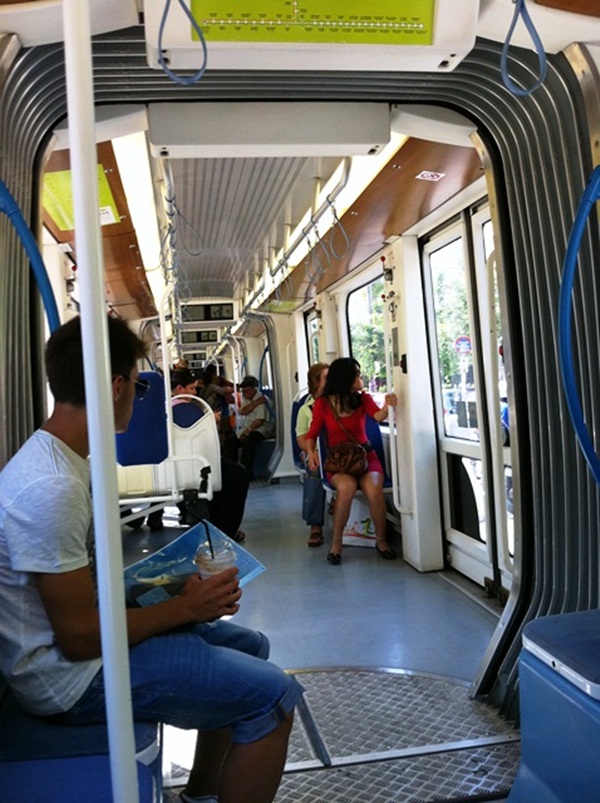
Besides buses, trolleybuses, trains, metro, trams are convenient to get around in Greek cities. I rode them in both empty and jam packed conditions. There were poor soliciting alms, handicapped selling wares, and the odd illegal immigrants from Pakistan and Bangladesh travelling with their trinkets-laden bags to and from beaches and city squares to run shoulders with on trams. There were pretty girls and well-built boys, like Greek goddesses and gods, groomed well, dressed in two piece bikinis, polka dresses, Jeans hot pants and cotton blouses and casual wear. What they wore appeared brand new despite the sweat trickling down the foreheads and arms. One of the begging girl, bonny and blonde, was a princess; my wife spoke of kidnapping her and adopting. She could put our own powdered Bollywood kids to shame from her sense of dress and persona. Should I think they scrub themselves really well, take care of their clothes and dresses, discard the washed down and soiled immediately, and live really well?
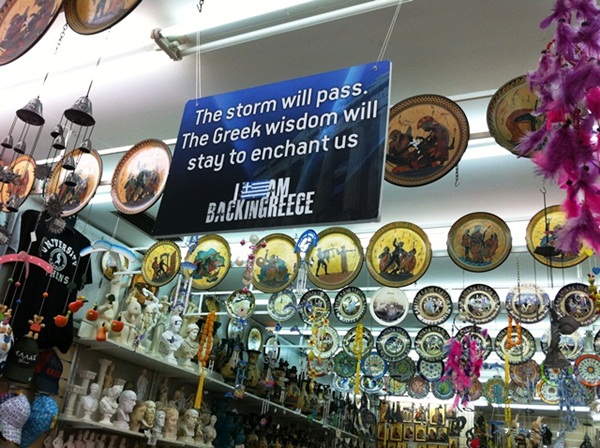
I asked a couple who run their family business selling souvenirs and antiques inside Plaka. It was all routed in their culture that had withstood centuries of conquests by various plunderers including Romans, Macedonians, Turks, and others. The goal in life was to develop habits of character so that one would pursue activities that yielded the purer pleasures and maximum enjoyment of good. This Greek wisdom is the fountainhead from which the nation would draw inspiration in its current challenge of a debt ridden public treasury.
One of those late nights in town, I watched Germany play England in the company of two 19-year old university students. One of them was studying political science and international relations. They were cheering the English team, and booing the Germans as they scored. I asked why? I don’t like Angela Merkel, he said. Germans have it today, but we will come back and prevail, he said.
That is proof. The young are not bitter though they are angry. Their values are in place. Therefore, the storm will pass. The Greek wisdom will stay to enchant us. I am backing Greece. Oppa! Let me down Ouzo to second that!
Three years have elapsed since my last trip
But my memory is very fresh. I can recall the faces and voices of hundreds of people I met and talked to. A very friendly, easy going, fun loving but extremely hard working and intelligent people, whatever the haughty Germans will say of them.
Today, as on 1st of July 2015, Greece has threatened not to make debt repayments to the troika of ECB, IMF and EU lender nations, mainly Germany. The nation’s total debt is about 243 Billion Euro including the bail-out loans. These loans were made since 2010 in order to keep greek banking system from collapsing and most of the funds went back as interest payments to creditors. Greeks received very little but had to endure the pain of the austerity measures imposed on them.
At the time of my trip three years ago, nearly 25% of youth were unemployed. Estimates today is 60% of them are unemployed. The GDP of the county has shrunk by 30% or so, due to the austerity measures imposed by the troika. Angela Merkel continues to be the most hated world leader in Athens.
In 2015, Greeks rejected pro-austerity political parties
Instead, in the elections held to Parliament in early 2015, Greeks rejected the conservative parties which have ruled them since democracy was restored. They gave 149 seats to leftist party SYRIZA in a house of 300, thus just 2 seats below the simple majority required. The minority government led by PM Alexis Tsipras has refused to buckle under Troika pressure but hold a national referendum, on 5th July 2015. The people will vote yes or no to the question if Greece should make debt repayments on schedule. if the vote is no, which is likely result, then Greece may exit default EU. If that happens, because Greece is a small economy of GDP of 210 Euro, it may be a storm in a tea-cup. Or will it boomerang as more nations will refuse to make their debt repayments?
I cannot raise my Ouzo to that, and say Oppa! But, whatever Greeks decide, I will back them, for they have gone through hell during the last seven years.
| Comments on this Article | |
| Ronald Sabi, Udupi | Mon, July-6-2015, 6:43 |
| Hi Philip, I enjoyed this very informative article on Greece; travelogue coupled with economy, peoples attitude, fun loving nature and the country’s infrastructure. 240 Billion Euro loan is a lot of money and the interest makes it heavier! My brother went to Greece with family last month and they said Greece was more joy than other Europe. I enjoyed the Ouzo they carried with them. It seems catholic monks invented it in the olden days for tranquility!? I am hoping to visit Greece in November. Hope eventually India learns to keep the country neat and clean like Greece! | |
| Philip Mudartha, Navi Mumbai | Mon, July-6-2015, 8:24 |
| The Greek have decisively voted No to more austerity. A new chapter begins for EU, Greece and the World. A new debate should begin in India. How long can a debt fueled development bring gross national happiness (GNH)? Which is more desired? GDP or GNH? Our PU college students, of HEC stream, what do you think? | |
| Conrad, Moodubelle/USA | Mon, July-6-2015, 6:44 |
| Philip, Excellent Article! Thanks for sharing! | |
| Eugene DSouza, Moodubelle | Sun, July-5-2015, 8:49 |
| Thank you Philip for your interesting and enlightening article on Greek financial crisis and your experience as a tourist in Greece. | |




 Write Comment
Write Comment E-Mail To a Friend
E-Mail To a Friend Facebook
Facebook Twitter
Twitter  Print
Print 














